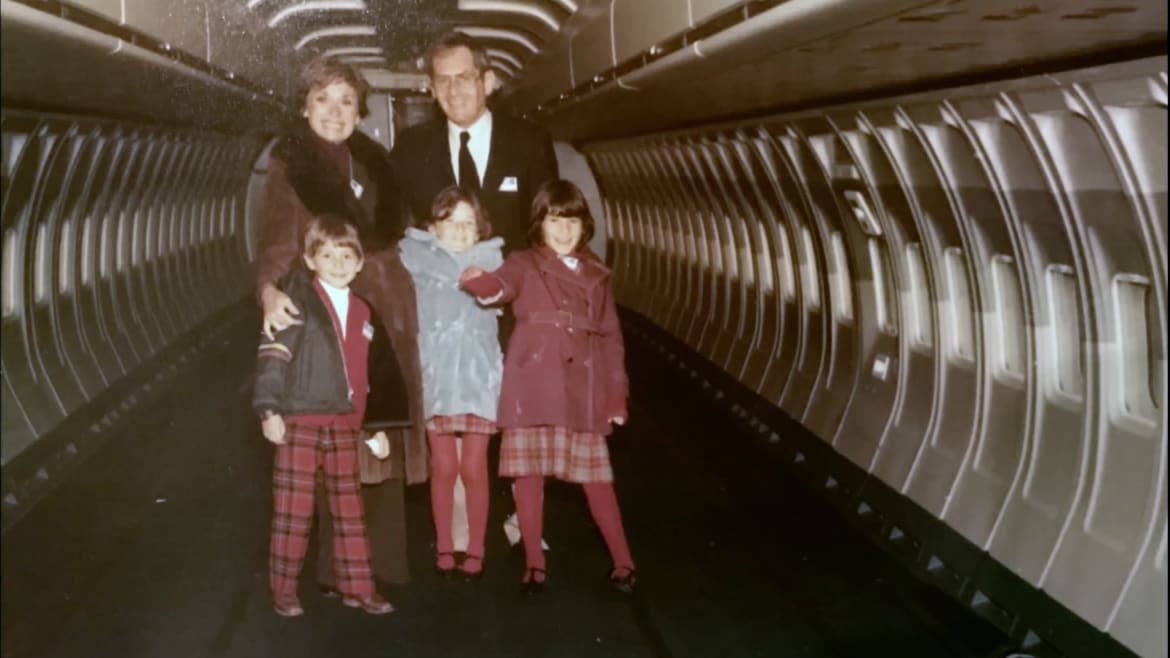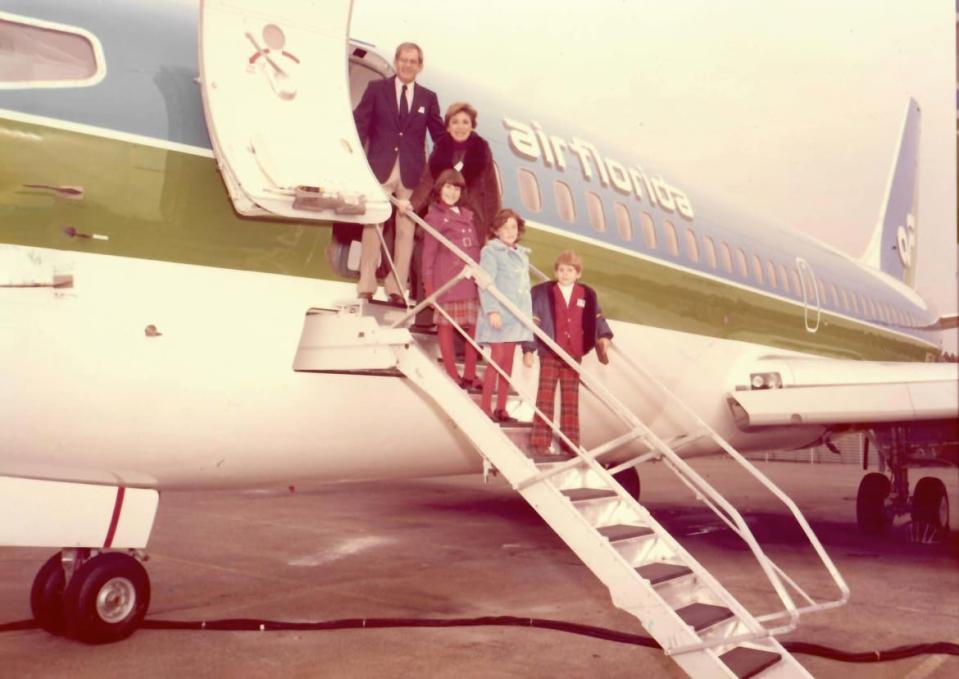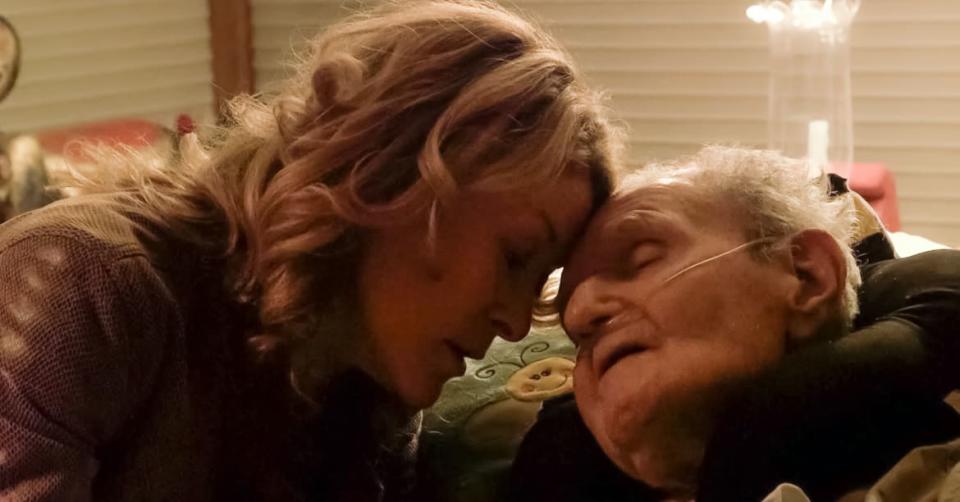How I Came to Film My Father’s Last Flight Home

- Oops!Something went wrong.Please try again later.
One day in July of 1982, my father Eli Timoner ran six miles, led a meeting of a thousand employees, went in for his weekly massage, and left on a gurney. He was paralyzed and blind on the left side from an accidental stroke caused by the manipulation of his neck. He was 53 and running the fastest-growing airline in the world at that time, a start-up called Air Florida, which was flying to 17 countries and employed 3,000 people, though he had founded it only 10 years earlier. I was his “pal,” the feisty, sensitive middle child who he always understood and defended. He “got me,” and I thought he hung the moon.
And then that summer day he was struck down instantly, wheelchair-bound at a time when there were no protections for the disabled, and you certainly never saw one running a huge public company. I was only 9 years old, and from that day forward, I witnessed the unraveling of a life before my very eyes. I learned that security is an illusion, as he was pushed out of the company he founded, only to watch it go bankrupt from mismanagement, and half the community turn their backs—either because they didn’t know what to say, or they couldn’t bear the thought of such a thing happening to them, or they didn’t want to be asked to help. The black-tie invitations stopped rolling in and gradually the Timoners went from being a royal family in Miami to social pariahs. Although there was “Eli’s Army” (the loyal couples that stood by my parents and even bailed them out financially) the shame took hold then and my father—the humble provider, the beloved patron of the arts, and leader of one of the most innovative companies in America—was crushed under the weight of his own body, which no amount of ingenuity could make work again.

The Timoner family in Last Flight Home
Still, he soldiered on with positivity and love. He survived by paying attention to all of us around him and rooting us on. He watched over his wife Lisa and his three children, Rachel, Ondi, and David, and he tried to care for us, cooking with one arm, trying to play tennis, balancing a cane while someone held the back of his shorts. I learned what tenacity looks like from him, and also how loving wholly can be one’s salvation. He loved us so much, it kept him going. He would pass the days in his chair by checking in, guiding us, cheering us on. He was so funny and sweet… and he was wise.
Thank God for the telephone, which rang with his voice on the other end the second every flight I ever took touched the ground, a gravelly voice on the end of the line: “Ondi?” It calmed me. It helped me to center as I ran around the world making extremely intense films. He reminded me of who I was and what really mattered. Whether it was the one phone call I was allowed to make after being arrested shooting DIG!, or outside the cult leader’s house while filming Join Us or coming out of a cyber-bunker in Manhattan shooting WE LIVE IN PUBLIC and heading for Mali to try to expose a corrupt dam project—my father was there, on the other end of that phone. He was my rock.
COVID was especially tough for the elderly and disabled. My father became less and less steady on his feet and went on oxygen to help with the congestive heart failure he was developing in his old age. Still, he tried to walk on his own to the bathroom. Sometimes it would take 30 minutes, and he would not call my mom for help for fear of being more of a burden to her than he already was, so he would just collapse. Once he fell and hit his head and blood was trickling down his face. I stood there helpless as seven large, masked EMTs gathered into my parents’ bedroom to lift him off the floor and onto a stretcher. Finally, in late January 2021, he was hospitalized due to constricted breathing to do with chronic obstructive pulmonary disease (COPD), and after five days in bed, he was told he would have to go to a facility because he could no longer walk. Though he was the most tenacious person I ever knew, the idea of being sequestered away from his family, of becoming a houseplant, was unthinkable to him and he called us repeatedly pleading with us to help him die.
My brother found that medical aid in dying was legal in California, only one of 10 states in the U.S. that allows us this basic human right. David found a hospice in Pasadena called Faith and Hope that would help us through this process. Daddy came home to start the clock on a 15-day waiting period, during which time he would need to prove he was of right mind, not being coerced into this decision, and that he could take the lethal medicine himself. We moved his hospital bed into the middle of the living room where he could be next to his beloved wife and in the middle of the action, and I put the word out to old employees, friends, and family that Eli would be leaving the living on March 3, 2021—a date of his choosing. I immediately saw the agency that making this decision, and knowing there was an end in sight, gave him.
For us, it was our last chance to show him that he had provided us with the greatest gift a parent and grandparent could—unwavering, all-accepting, unconditional love. He felt he had failed us because he was bankrupt financially, but he couldn’t see how rich he was in adoration.
I can’t remember Dad as an able-bodied man, before his stroke—not a single memory from before I was 9—so I felt a desperate need to start filming him. I wanted to at least capture his voice and personality before he was gone forever. I was worried that I would be mediating my own experience or that of my family, so I went to see a spiritual adviser I seek counsel from when I find myself at a loss. She told me, “If you feel you need to document, then you should, but fill yourself up with him first.” I asked my father, who immediately replied, “I instinctively know you are on the right track.” I set cameras on sticks and attempted to streamline things so that the process of filmmaking itself was as minimally evident as possible. I needed these permissions, but because I have been documenting life as it unfolds for 30 years, it’s second nature to me. I could just get the cameras rolling and then focus on spending these precious moments with Dad without distraction. I would usually forget about them, and I have heard my family tell me the same.
I have always been grateful for the endless learning being a filmmaker these last 30 years has allowed me, but it has never been there for me on a personal, emotional level until now. I only set out to document Dad’s final days, gather all the knowledge about his past, our ancestors, and bottle up as much of his love and wisdom as I possibly could. When he was no longer with us, but alive inside the AVID editing system, I understood the infinite, magical power of film.
Three weeks after my father died, we held a memorial service online. My sister Rachel, who is a rabbi, asked me to edit a five-minute piece, but one week later, I had a 32-minute video. I was so comforted in the edit bay as I got to experience his wit and wisdom, and witness all the love that was in that room—which was the most sacred space I have ever inhabited. I spent nights up with him and never stopped editing until a feature film emerged. My mom watches the film almost every night to spend time with my father.
Still, the night before the film premiered at Sundance, I thought, “Oh no, what have I done?” I felt a great responsibility in sharing my family at their most raw and vulnerable, but what we experienced over those weeks was so profound that it ultimately felt wrong to withhold it. Our learning had been too great, not only about how to send off a loved one, but also about how to live now and what to prioritize. Thankfully, my family has really gotten behind the film, because they see how deeply it affects people.
I have always found it ironic that the more intimate and personal a piece of work, the more relatable it is. Audience members tell us that they see their own loved ones and themselves in the film, and that it helps them to look at the universal questions surrounding life and death.

Filmmaker Ondi Timoner and her father Eli in Last Flight Home
Hearing audience members cry about their loved ones who could not help but suffer, we are also more determined than ever that part of Dad’s legacy should be in helping medical aid in dying get passed into law in the 22 states where it is currently being considered, so that other terminally ill patients who want to end their suffering have that right. Just as we are able to make decisions about how we birth our children, we should have the choice about how we leave this world.
I am in New York right now, where death with dignity is illegal. I have heard that part of the reason it hasn’t passed for seven years is economics—there’s lots of money to be made in preserving life. Another significant obstacle is religion, so my sister, Rabbi Rachel Timoner, is assembling a group of clergy across different denominations to tackle this topic in that arena. I didn’t make the film for this reason, but we dearly hope that this film will help important organizations like Compassion & Choices to get these bills passed.
In sharing this film, I find myself questioning what it is to be alive or dead. Was he more alive when he was sitting stuck in a chair, hidden from the world, struggling to the bathroom and back? Or is he really dead now that he lives in the hearts of all who see the film and helps them with their own deepest questions about the meaning of life and death? I have always hoped as an artist to make work that will help people, so watching the impact of this is a blessed journey to be on. My father was in a lot of pain that I could never take away, but at least, thanks to the alchemy of film, his suffering can help others to suffer less. I think one of the biggest reasons Dad took his life was that he felt he could do more to help us if he was free from his body. He promised to watch over us, and he was sure he would be watching. I believe this film is his final gift to me, to my family, and now—to us all.
Last Flight Home is now playing in theaters.
Get the Daily Beast's biggest scoops and scandals delivered right to your inbox. Sign up now.
Stay informed and gain unlimited access to the Daily Beast's unmatched reporting. Subscribe now.

